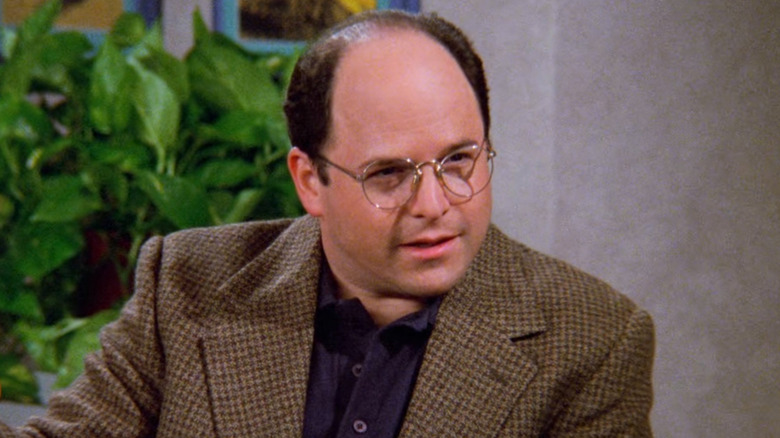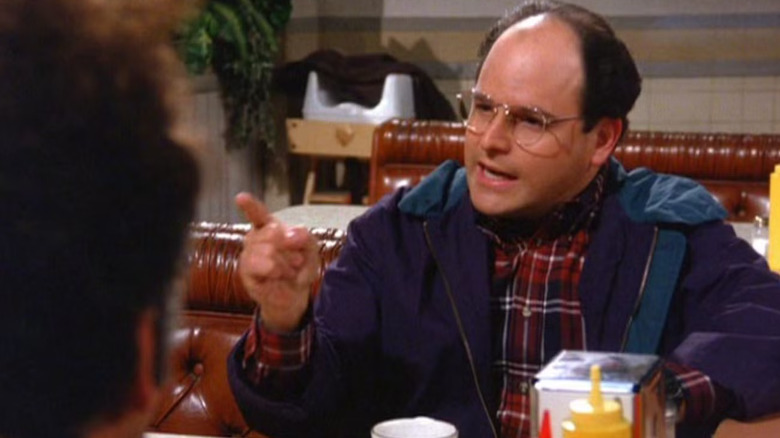Why Jason Alexander And The Seinfeld Cast Were Confused By George Costanza's Reputation
The Popularity of Larry David's and Jerry Seinfeld's sitcom "Seinfeld" was a sign that American TV audiences were ready for a change. Throughout the 1980s, traditional American sitcoms had become stale, seen (by some snarky youngsters) as a placid, undramatic remnant of a former generation. By the late 1980s, three shows arrived to turn the medium inside out. "Married... with Children" was a traditional sitcom in structure — it was about a white, suburban, nuclear family — but horrifying in practice. The characters were selfish, greedy, stupid, sexist, and sadistic. In 1989, the world witnessed the debut of "The Simpsons," an animated series that featured boorish blue-collar characters who all resented a world that never helped them. The show quickly became semi-surreal. Sitcoms were dead.
And then there was "Seinfeld," a series that is often called "a show about nothing." One of the creative mandates of "Seinfeld" was that none of the four main characters — played by Jerry Seinfeld, Jason Alexander, Julia Louis-Dreyfus, and Michael Richards — were to learn anything. There were to be no hugs, no lessons, no morals. The four lead characters of "Seinfeld" would remain just as neurotic and petty at the end of an episode as they were at the start.
The four main characters on "Seinfeld" were Jerry (Seinfeld), a neurotic professional comedian, George (Alexander), who couldn't hang on to a job, Elaine (Louis-Dreyfus), who was unlucky all around, and Kramer (Richards), a kook with many get-rich-quick schemes.
In 1994, when "Seinfeld" was at the end of its fifth season, an article in the Los Angeles Times declared George to be the most relatable of the four. His neuroses and pettiness seemed the most human and least aloof. Alexander met people regularly who said they were related to George. This confused the actor, of course. He theorized that George, despite his unseemly wrath and tendency to lose jobs, was the most human of the four.
George was the most human character on Seinfeld
George, it should be said, was the most easily annoyed of the "Seinfeld" characters. He lost his temper a lot, got into fights, and often played devil's advocate. He never lashed out at his three best friends, really, but he was certainly angry at the world at large. Of the four characters, it was George who was most frequently caught in his lies, the one who got busted. Perhaps it was George's bad impulses, and the subsequent guilt of being caught, that people related to.
When asked about the phenomenon of George's relatability, Alexander said:
"Everywhere I go, somebody says, 'I am just like George' or 'I know someone like George.' You know, George is a very heroic loser. But I don't know why people gravitate to him so much. He seems to be the character everyone touchstones to. He seems the most realistic. [...] People will laugh at [Kramer], but they don't recognize him. George, still with everything, is in the realm of guys that we know. But why we have senior citizens responding to him, why we have little kids responding to him, why we have women in their 40s responding to him. No one is more surprised than we are."
"Heroic loser" is a wonderful way of describing the character. Kramer, as mentioned, is a kook. He's a silly and outlandish character. Everyone knows George, though. Or is George.
When "Seinfeld" ended in 1998, Alexander was already fostering a healthy voice acting career, starring in "Duckman," "Aladdin," "Hercules," and "Dilbert." He played Max Bialystock in the National Tour production of "The Producers," and achieved his lifelong dream of appearing on "Star Trek" (he was in one episode of "Voyager," and 23 episodes of "Prodigy"). He was in four episodes of "The Marvelous Mrs. Maisel" and dozens of other hit TV shows. More recently, Alexander played Tevye in a production of "Fiddler on the Roof."
He may have embodied George, but Alexander is a pliable and talented actor beyond.

